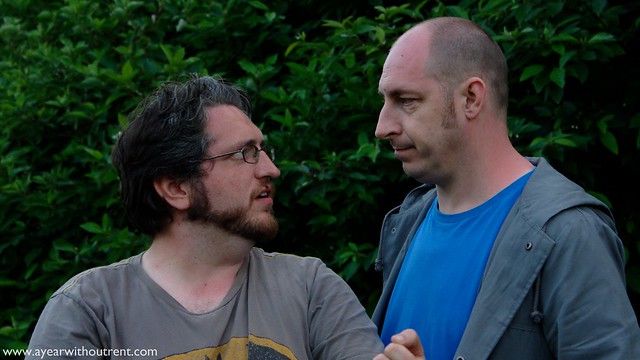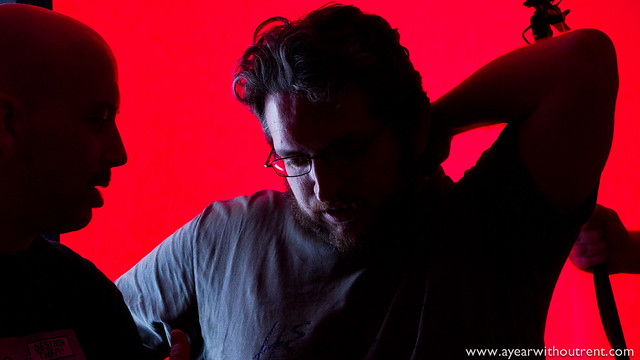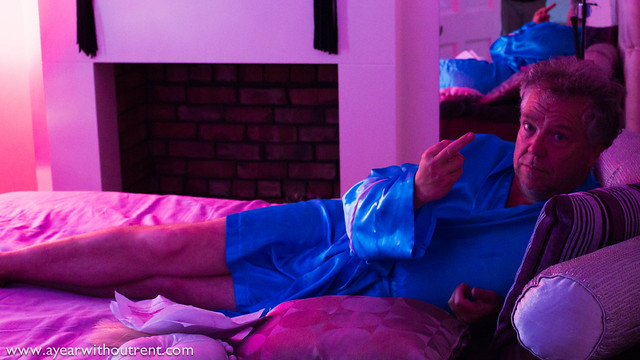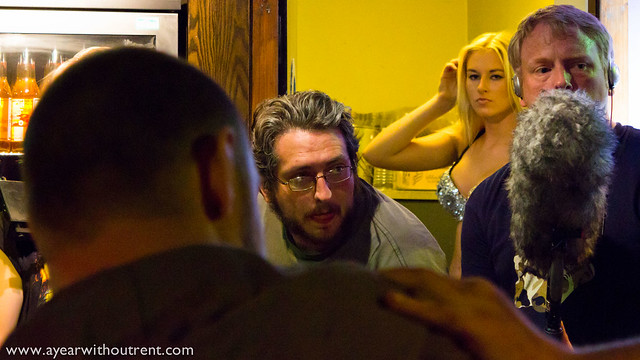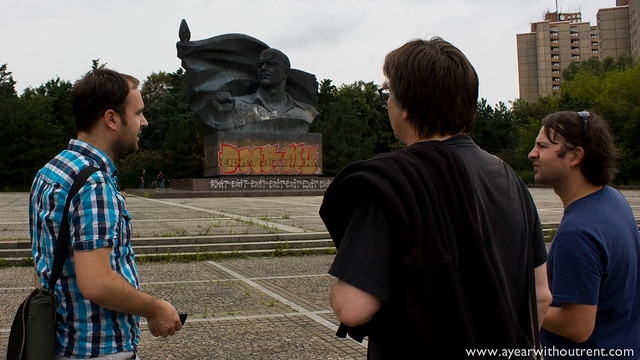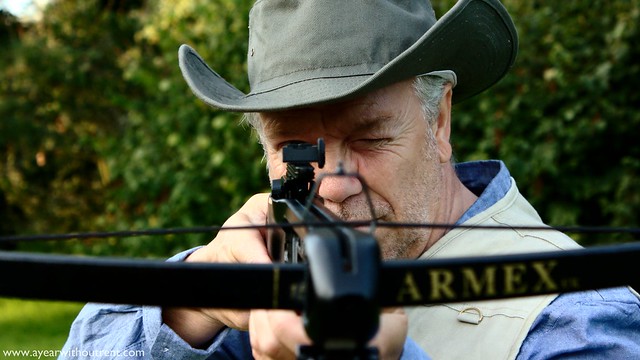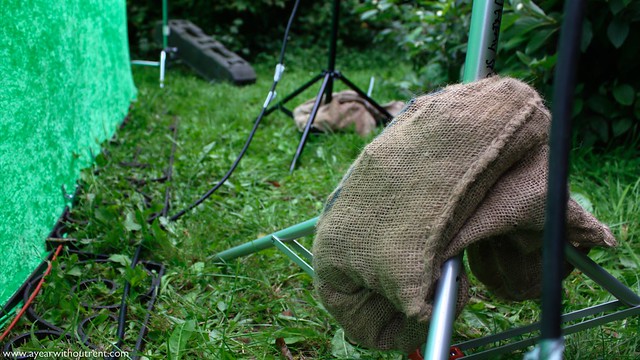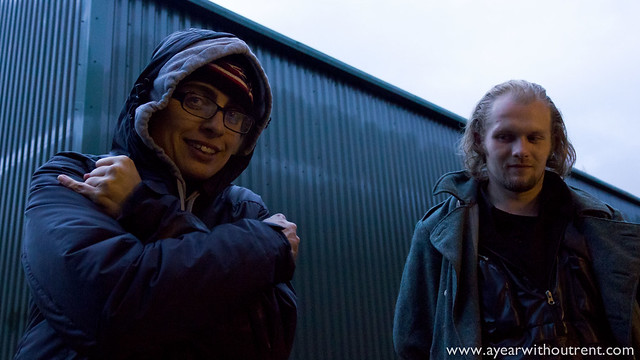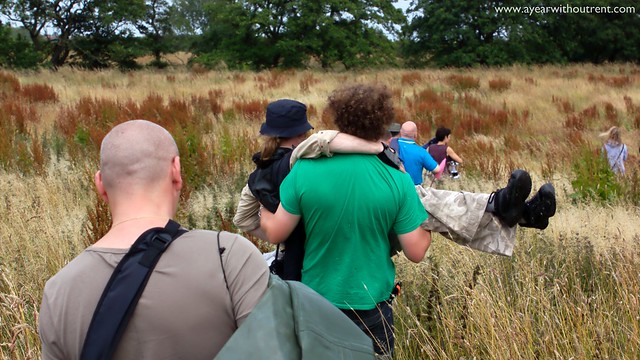 Back to selection
Back to selection
A YEAR WITHOUT RENT, PART SIX
I wasn’t supposed to go to Europe. You can’t really drive there (unless you’re the Muppets) and flights across the pond are expensive, but when a production comes calling, I listen. This one made it easy, asking would I come to the UK if they covered the plane ticket?
A no-brainer.
Which is how I ended up in Newcastle upon Tyne, a small city near Scotland, serving as gaffer in a country where I have absolutely no idea how the electricity works. And when I ask how much I can put into a circuit, I’m told that, well, that depends on the wiring. In other words, no one knows. My solution? Start plugging stuff in until the circuit trips, unplug the last one, and see how much is left. There’s the answer.
The United Kingdom (England?) is only my second non-US country on A Year Without Rent, but one thing that seems to be evident is that the American DIY mentality, the one that says “fuck y’all, we’re making this movie whether you like it or not”, isn’t nearly as prevalent as it is in the States. Oh sure, it’s there, but it’s on a delay. There’s no Gregory Bayne overseas (hell, there’s only a handful in the U.S.). Or if there is, I haven’t heard about him, which might be all the proof you need.
Follow me on a tangent. I’ll get back to my trip to Europe in a minute. Honest.
It’s been a couple of years since indie filmmakers in the U.S. could rely on studios or the festival system or pretty much anyone to take care of them. Oh sure, Sundance used to create careers more or less out of thin air, but anyone who’s been paying attention knows those days are long gone. Kevin Smith said recently that CLERKS probably wouldn’t get into Sundance if he made it now. I’ll go further: he probably wouldn’t even bother submitting it, and if he did, I doubt it’d get much serious consideration.
Every month, more indie filmmakers come to the conclusion that no one’s going to swoop in and buy their film for seven figures. They’ve long ago figured out that no one else is going to fund it for them, and now they’re coming full circle and realizing that they’re on their own, pretty much forever.
Robert Redford isn’t walking through that door.
That leaves 2 options: 1) go to law school, or 2) go fully DIY. Most people who select the latter quickly realize that it’s a lot of fucking work, much more than they anticipated. They do it for a bit and eventually they either sink or swim (or at least learn how to tread water). This is not a bad thing, and I’d elaborate as to why, but that’s a different column.
For those who swim, way off in the distance there’s a couple of specs, people way ahead of the curve who’ve been swimming for years, not months. Edward Burns is one of those specs, as are Jon Reiss and Gregory Bayne. They figured all this out a long time ago.
In the States, this is not at all surprising. America, for all it’s many faults, has always perpetuated the idea (pipe dream?) that anyone can grab his or her bootstraps and create a success, with nothing more than ingenuity and hard work. It’s what our country was built on. Well, that and slave labor.
So when someone like Edward Burns or Gregory Bayne surveys the landscape and sees a pretty shitty system, they do what the American myth has taught them to do. They blaze their own trail, obstacles be damned. Sometimes they reach the Pacific Ocean. Sometimes they die of dysentery.
This is coming off as a very pro-USA rant, kind of like a bad Stephen Colbert bit. It’s foolish to assume that Americans are inherently different from their counterparts across the pond. It might just be a product of systems. For years, American indie filmmakers have gazed longingly at the government subsidies offered overseas. I mean, why wouldn’t we? Their governments give them money to make their films. Like, for free! How fantastic is that?
Turns out, it’s not so fantastic. The British filmmakers I talked to would rather have our system.
I didn’t believe them any more than you believe me.
Their argument is pretty simple: Government support is pretty great if you’re the type of person the government supports. Because, hey, money talks. But how do you become one of those people? Well, it’s a decision made by a politician. How do you think you become one of those people?
So let’s say you don’t make the type of films that sit well with the career politician who may or may not think that cinema begins and ends with British period dramas. Then you’ve gotta go find your funds privately. The first thing that investor wants to know is why you aren’t getting funds from the government. This makes total sense. So instead of pitching your film, you’re rationalizing away the system, explaining to a dentist why the financing system in the UK is fundamentally flawed. It’s a barrier. Kind of like casting an ugly guy and a beautiful girl as your romantic leads. No matter how good they are, the audience is going to spend half the film trying to figure out what she could possibly see in him. We don’t have that problem over here. No one thinks we’re getting money from anywhere but the private sector.
Maybe that’s it and maybe it isn’t. But when my Europe trip got extended to Berlin to give a keynote speech at a crowdfunding event, it was striking to see how far behind Germany is in general awareness of how crowdfunding works. It was like walking through a time warp. Over at the blog I theorized that it stems from not having Kickstarter in the equation to really drive the discussion and awareness forward.
In my mind, it kind of leads to a chicken and egg question. Did Kickstarter create the Gregory Bayne’s, or did the Gregory Bayne’s create Kickstarter? I think it might be the latter. People like that are going to find their way to Pacific Ocean no matter what. If no one invents the wagon, that doesn’t mean there isn’t going to be an Oregon Trail. People like that find a way.
Personally, I think Kickstarter has been so successful because the need exists. Musicians and filmmakers had be toying with those very same principles on their own for a couple of years. All they did was slide nicely into that void.
But enough about that. You want to know what’s different about filming in the UK (understanding that it’s entirely possibly I was just on a weird set, but considering that half the crew was from Newcastle and the other half from Bristol, that seems less likely).
1. If you’re carrying around gear and yell out “Points!”, no one is going to move. They don’t know what that means. Apparently they yell “Heads!”, which makes sense, but it’s a hard habit to break. Invariably I’d yell out “Points!”, nothing would happen, and then being in a hurry I’d follow that with “Get the fuck out of the way!” That always works.
2. Ask for a “bullet” and you’ll get a blank look. And maybe for a C-47 as well. They call them “pegs” and I got the impression that they don’t really use them all that much. Instead, there were a lot of alligator clips.
3. We didn’t have PA’s. We had runners. They did the same thing as a PA (well, they were supposed to), but a PA is something entirely different over there. I’m not sure what, though. Seems that PA’s are a step above runners, who mosts fetch things.
4. They’ll deny it, but I know what I saw: there were tea breaks. Real, actual tea breaks on set. It was kind of stunning. I’d never seen that before. There was, at one point, a silver platter carrying the tea, but I’m told that’s because it was the only thing they had to carry it with. Thing is, we were in the woods. Where the hell did the silver platter come from?
Beyond that (and the electricity), it’s a mentality thing. A process of working that’s cultural in origin. It took visitors to the set approximately 10 seconds to figure out there was an American in the crew, and not just because I ripped down a tree branch that was too close to a 2K and told the DP it was “the George W. Bush method”. But as the lone American on set (not counting director James DeMarco, who’s lived in Newcastle for years), it’s a difficult thing for me to get a proper perspective on.
So I emailed the producer of THE STAGG DO, Zahra Zomorrodian (@fnafilms) to get a second opinion. Zahra is British born and raised, but spent a couple of years living in LA, which is where she met her husband, James DeMarco (a.k.a. the director of THE STAGG DO). Also, they have a pretty great story about Lawrence Tierney. This is her response to my question about the differences of UK and US productions from a cultural perspective.
Under normal circumstances I’d say there are differences – not massive differences just differences – nuances if you like. Culturally Britain and America are quite similar so it stands to reason that culturally our crews would be quite similar. My observations (from a very small sample size) are that US crews work harder – that’s not to say they work smarter or that British crews are lazy but overall their work time is better defined with less joking about and a more business-like attitude. I’m not sure I like this way of working – but again in my limited experience it’s like that generally in the States not just on crews. Don’t forget we have 4 weeks holiday here and usually a 40 hour work-week in the States that would be almost unheard of. Of course you also have to remember that on bigger budget Hollywood stuff a lot of the production takes place here at studios like Pinewood so US and UK crews have and do work together all the time, a lot of the en vogue directors at the moment are from the UK, like Yates and Nolan and of course top DPs like Roger Deakins are Limeys too! Way back, when I lived in LA, I had a lot of British friends who were crewing on Hollywood movies across many departments and grades from ADs to hairdressers and they worked constantly so I guess once they adapt to the cultural differences then there’s very little difference.
Sounds like there’s a reality show there. Take some DIY American filmmakers, pair them with crews from around the country, and see who adapts to who first. I bet they adapt to the Americans. If only because that’s what Stephen Colbert would want us to do.
Filmmaker Lucas McNelly is spending a year on the road, volunteering on indie film projects around the country, documenting the process and the exploring the idea of a mobile creative professional. You can see more from A Year Without Rent at the webpage. His feature-length debut is now available to rent on VOD. Follow him on Twitter: @lmcnelly.
